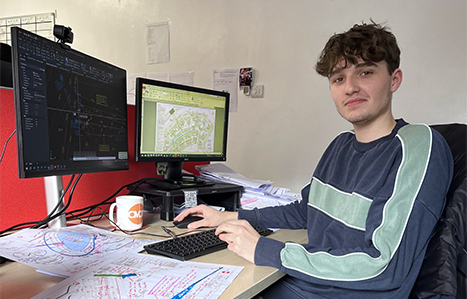Exeter students get their skin checked out
Students at Exeter College have seen at first-hand the effect of sun damage on their skin, as part of NHS Devon’s new skin cancer prevention strategy for 2011-2014.
NHS Devon has teamed up with the college to train 30 beauty students to use an ultra violet (UV) facial scanner that reveals signs of overexposure to UV rays from the sun or sunbeds.
The scanner clearly shows brown spots, freckles and redness, which can occur as a result of UV exposure even from an early age.
Overexposure to UV rays can lead to premature ageing, including wrinkles and coarse, leathery skin, or worse, skin cancer.
Steve Brown, NHS Devon’s assistant director of public health, said:
“We know that many teenagers think it’s worth burning to get a tan, so we have made them a priority target group.
“Devon has the fourth highest incidence rates of malignant melanoma in the country, due partly to its high number of sunshine hours, an older population than the national average and a high percentage of the population of white ethnicity (people with fair skin are at higher risk of the disease)
“However, skin cancer can be prevented, if simple sun safety messages are followed.
“The top rule is to never burn. Burning can be avoided by seeking shade between 11am and 3pm, covering up with sunglasses and clothing, and using at least SPF 15 broad-spectrum sunscreen with at least a 4* rating, applied regularly and liberally.”
“Our team of trained student beauty therapists are running lunchtime roadshows across the College” said Nick Bridge health and well-being manager at Exeter College. “It’s really important that we increase students’ knowledge of using sun protection and our ‘Love your Skin’ sessions have a really important message about staying safe. With a heatwave predicted in the next few weeks, the work with the NHS Team couldn’t have come at a better time.”
The new strategy is a multi-agency partnership which also involves local authorities, environmental health, schools, colleges, acute hospital trusts, GPs and pharmacies.
As well as teenagers, the strategy is also targeting over 50s, with the message to ‘check your skin regularly and see your GP if you notice any unusual changes’. Skin cancer can usually be treated easily if it is caught at an early stage, but can be deadly if left too long.
For more information or interviews contact Paul Hopkins on 01392 267 647 / 0797 133 0491 or Sylvia Jarman at Exeter College on 07800 745855



